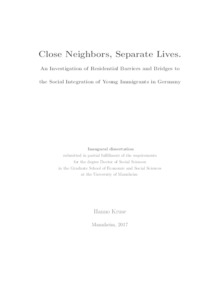|
Close neighbors, separate lives : an investigation of residential barriers and bridges to the social integration of young immigrants in Germany
Kruse, Hanno
![[img]](https://madoc.bib.uni-mannheim.de/42676/1.hassmallThumbnailVersion/Kruse_2017_Dissertation.pdf)  Vorschau |
|
PDF
Kruse_2017_Dissertation.pdf
- Veröffentlichte Version
Download (5MB)
|
|
URL:
|
https://madoc.bib.uni-mannheim.de/42676
|
|
URN:
|
urn:nbn:de:bsz:180-madoc-426764
|
|
Dokumenttyp:
|
Dissertation
|
|
Erscheinungsjahr:
|
2017
|
|
Ort der Veröffentlichung:
|
Mannheim
|
|
Hochschule:
|
Universität Mannheim
|
|
Gutachter:
|
Kalter, Frank
|
|
Datum der mündl. Prüfung:
|
14 Juni 2017
|
|
Sprache der Veröffentlichung:
|
Englisch
|
|
Einrichtung:
|
Außerfakultäre Einrichtungen > GESS - CDSS (SOWI)
Fakultät für Sozialwissenschaften > Allgemeine Soziologie (Kalter 2009-)
|
|
Fachgebiet:
|
300 Sozialwissenschaften, Soziologie, Anthropologie
|
|
Normierte Schlagwörter (SWD):
|
Migration , Integration , Freundschaft , Nachbarschaft , Soziales Netzwerk , Stadtsoziologie , Segregation , Schulwahl
|
|
Freie Schlagwörter (Englisch):
|
Immigration , integration , friendship , neighborhoods , social networks , urban sociology , segregation , school choice
|
|
Abstract:
|
For the social integration of young immigrants, neighborhoods usually matter: the more native neighbors you have, the more native friends you make. This dissertation challenges this common belief. Examining residential barriers and bridges to the social integration of young immigrants in Germany, it shows that for immigrants with a higher socioeconomic status (SES), neighborhoods matter greatly. For immigrants of lower SES, however, they do not. In other words, neighborhood effects on immigrants' friendships are SES-specific. To explain this curious finding, the dissertation relies on four consecutive empirical studies. The first study tests a central methodological prerequisite; whether the available measures of neighborhood composition are appropriate indicators of residential barriers and bridges (Chapter 2). The second and third study each address specific aspects of the link between neighborhoods and friendships: how adolescents' place of residence affects their friendship choices (Chapter 3) and the choice of their meeting contexts (i.e., their school choices, Chapter 4). Finally, the fourth study combines these insights and solves the empirical puzzle of SES-specific neighborhood effects (Chapter 5). The four empirical studies rely on various data sources, linking nationally representative survey data (CILS4EU), administrative data, and information from a private geomarketing company (Microm). Each empirical study thereby applies a different analytical method: regression techniques (Chapters 2 and 5), counterfactual analysis based on simulations (Chapter 4), and exponential random graph modeling for cross-sectional network data (Chapter 3). Concerning the central question of the dissertation, results suggest two reasons for SES-specific neighborhood effects: First, low-SES immigrants attend more concentrated meeting contexts (i.e., schools) than high-SES immigrants, yielding different opportunities for native friends even when neighborhood compositions are identical. Second, low-SES immigrants are less open toward natives as friends (or natives are less open toward low-SES immigrants). Beyond this central finding, each study contributes on its own; either methodologically (Chapter 2), concerning adolescent friendship formation (Chapter 3), or concerning ethnic segregation in secondary schooling (Chapter 4). Overall, this dissertation shows that living close to natives is a necessary condition for a successful integration of young immigrants, but not a sufficient one. A native environment is what it all starts with-it is not the panacea to make integration work.
|
 | Dieser Eintrag ist Teil der Universitätsbibliographie. |
 | Das Dokument wird vom Publikationsserver der Universitätsbibliothek Mannheim bereitgestellt. |
 Suche Autoren in Suche Autoren in
Sie haben einen Fehler gefunden? Teilen Sie uns Ihren Korrekturwunsch bitte hier mit: E-Mail
Actions (login required)
 |
Eintrag anzeigen |
|
